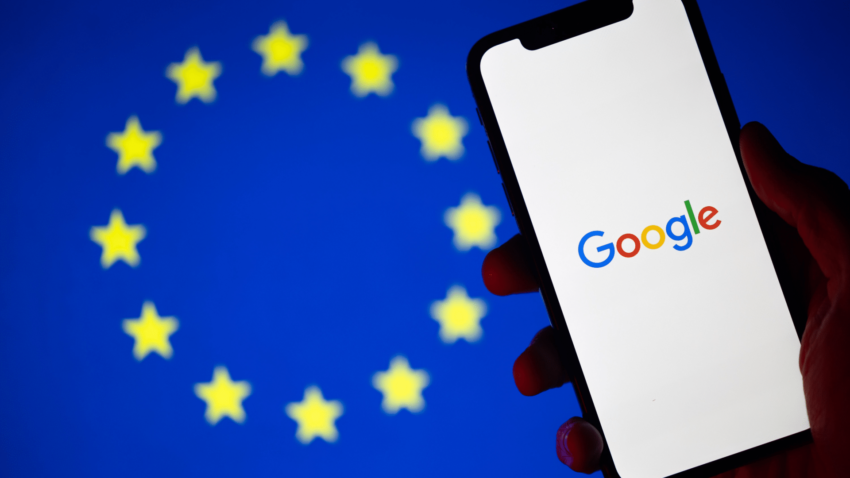The Digital Markets Act (DMA) was created to alter the digital panorama in Europe. This new EU laws goals to advertise competitors, cease monopolistic conduct and make sure that digital markets are fairer and extra open.
To know its significance, we first have to discover how Google turned a dominant power within the search business and the way this dominance has impacted the market.
How Google turned a search monopoly
Google’s journey to dominance started within the late Nineties.
In 1999, it was a search engine that allowed customers to find new manufacturers simply. Its algorithms offered quicker, extra related outcomes than different search engines like google of the time, and it rapidly turned the popular platform for net customers globally.
By the early 2000s, Google revolutionized how individuals and companies accessed info. The introduction of SEO (SEO) additional amplified this.
Manufacturers worldwide started investing closely in search engine marketing to make sure their services have been extremely ranked on Google. The expansion of search engine marketing cemented Google’s function because the central participant within the search ecosystem.
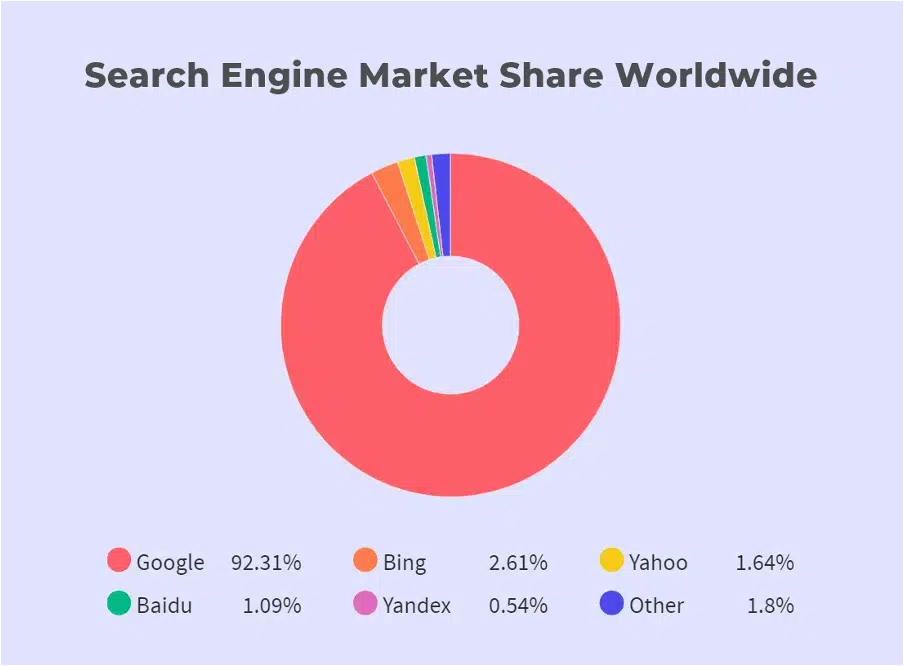

Nonetheless, as Google’s search platform grew, it expanded past offering hyperlinks to third-party web sites and launched its providers, akin to Google Flights, Google Buying and Google Accommodations.
Initially, these merchandise supplied customers larger comfort, however over time, in addition they allowed Google to prioritize its personal providers over these of its opponents.
Google achieved near-complete market management, with over 90% of world search visitors flowing by its platform by the mid-2010s. This was a staggering achievement, but it surely additionally raised severe considerations.
As Google more and more self-preferenced its merchandise in search outcomes, competitors was stifled.
For instance, journey startups and comparison-shopping web sites started to see vital declines in visitors as a result of Google would place its personal choices on the high of search outcomes.
Based on a European Commission report, Google’s practices decreased visitors to rival comparability providers by as a lot as 85% within the U.Ok., 92% in Germany and 40% in France.
This overwhelming management throughout a number of verticals within the digital house gave Google unparalleled energy, which many critics argue got here on the expense of competitors, innovation and shopper selection.
The Digital Markets Act
In response to Google’s dominance, the European Union took motion.
After years of authorized battles and fines, the EU handed the DMA, which got here into power in 2024.
The DMA goals to make sure that massive on-line platforms, referred to as “gatekeepers” (like Google), don’t abuse their market energy.
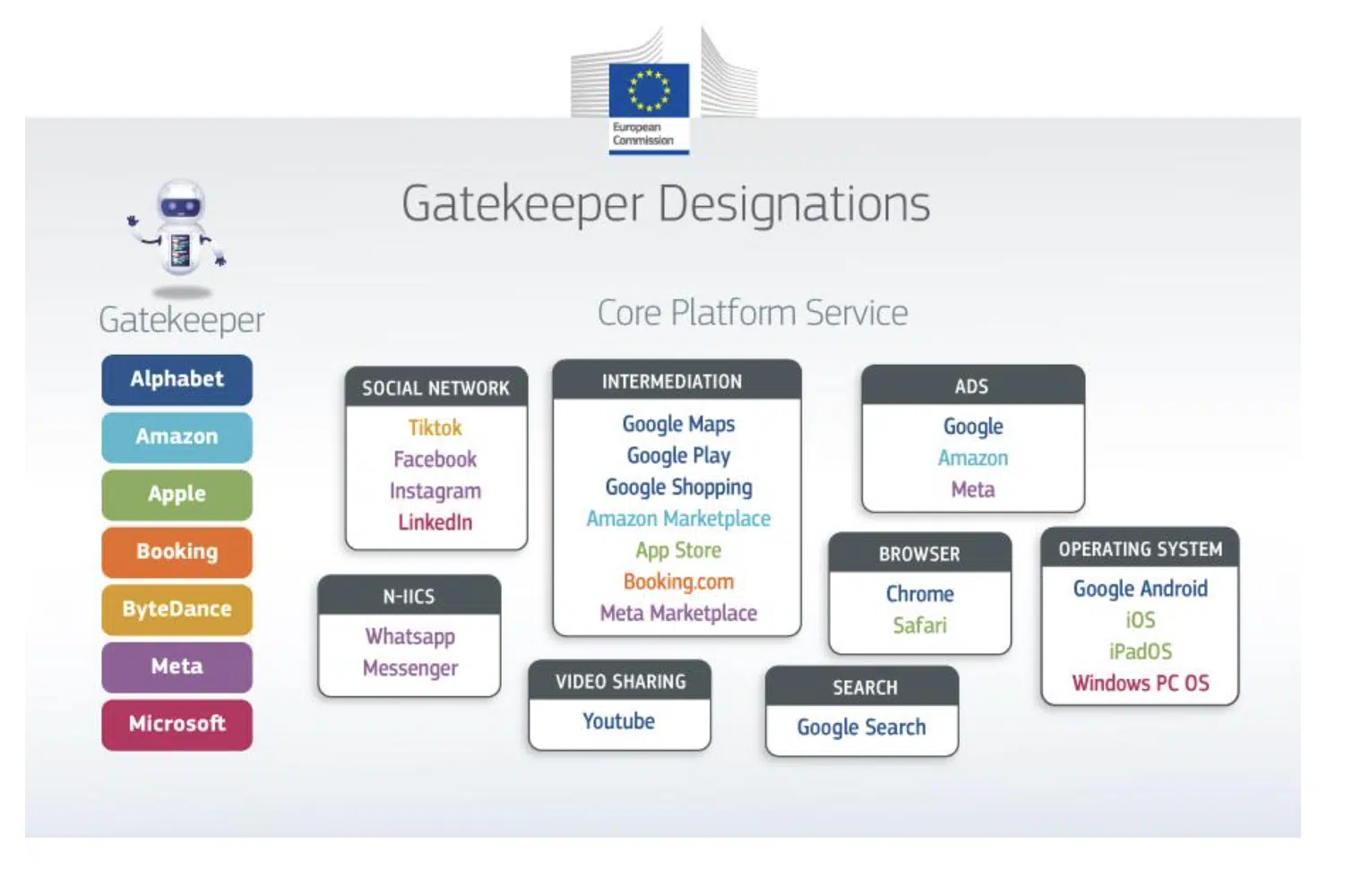

The DMA introduces a number of vital guidelines designed to revive competitors and forestall monopolistic practices:
- “No preferencing” rule: This rule prevents gatekeepers from favoring their very own providers in search outcomes. As an example, Google can not promote Google Flights or Google Accommodations over competing providers in the identical class.
- Extreme penalties for non-compliance: Corporations that violate the DMA face steep fines, as much as 10% of their international annual income, with extra penalties for repeated offenses. Given the dimensions of Google’s operations, this might translate into billions of {dollars} in fines.
The DMA additionally targets different practices, akin to service bundling, unfair entry to knowledge and restrictions positioned on app builders utilizing the platform. It goals to degree the taking part in discipline, guaranteeing smaller corporations have a good likelihood to compete out there.
Whereas Google has expressed willingness to conform, its operations’ sheer dimension and scope imply that full compliance would require a major shift in its operations.
It additionally stays to be seen whether or not these adjustments will meaningfully cut back Google’s dominance or just create new hurdles for opponents.
Dig deeper: Google unveils major changes to ensure Digital Markets Act compliance
Get the publication search entrepreneurs depend on.
Why does this matter for SEOs?
For the reason that DMA got here into impact, the influence on Google’s search outcomes is noticeable, particularly within the journey sector, which was closely dominated by Google’s providers.
Vital shifts in search engine outcomes pages (SERPs) for travel-related key phrases occurred in a number of European nations, together with Italy and Germany.
I turned an investigator and partnered with seoClarity, which offered me with vital analysis on the adjustments in search outcomes of over 1.5 million key phrases in Italy and Germany.
For instance, when customers in Italy seek for journey or lodge info, they now typically see comparability options on the high of the SERP, exhibiting outcomes from a wide range of totally different providers quite than simply Google’s personal merchandise.
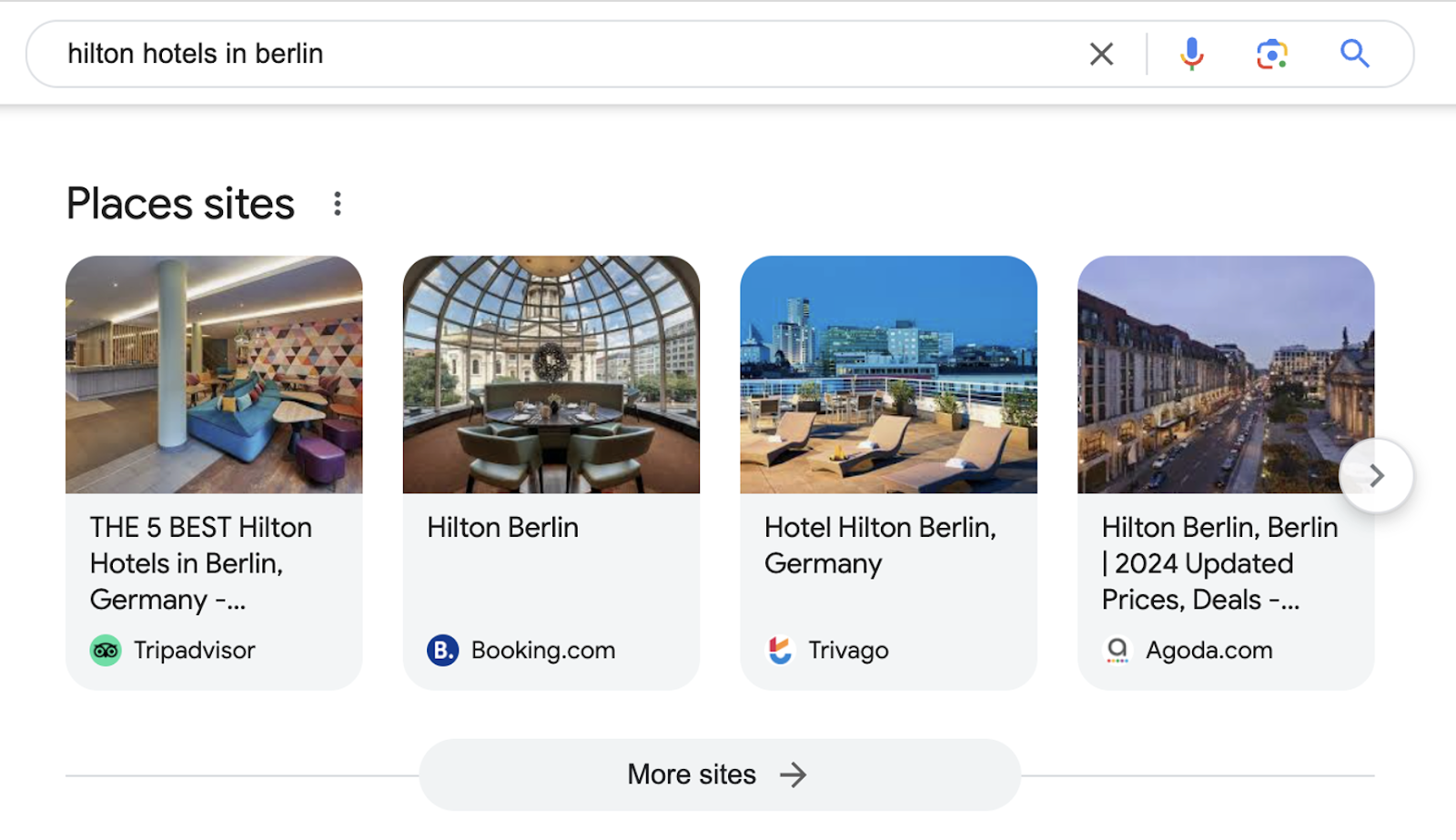

Knowledge from a research of 150,000 travel-related key phrases within the Italian market confirmed that comparability options seem in 81% of searches within the high three positions – indicating that Google is starting to adjust to the no-preferencing rule on this sector.
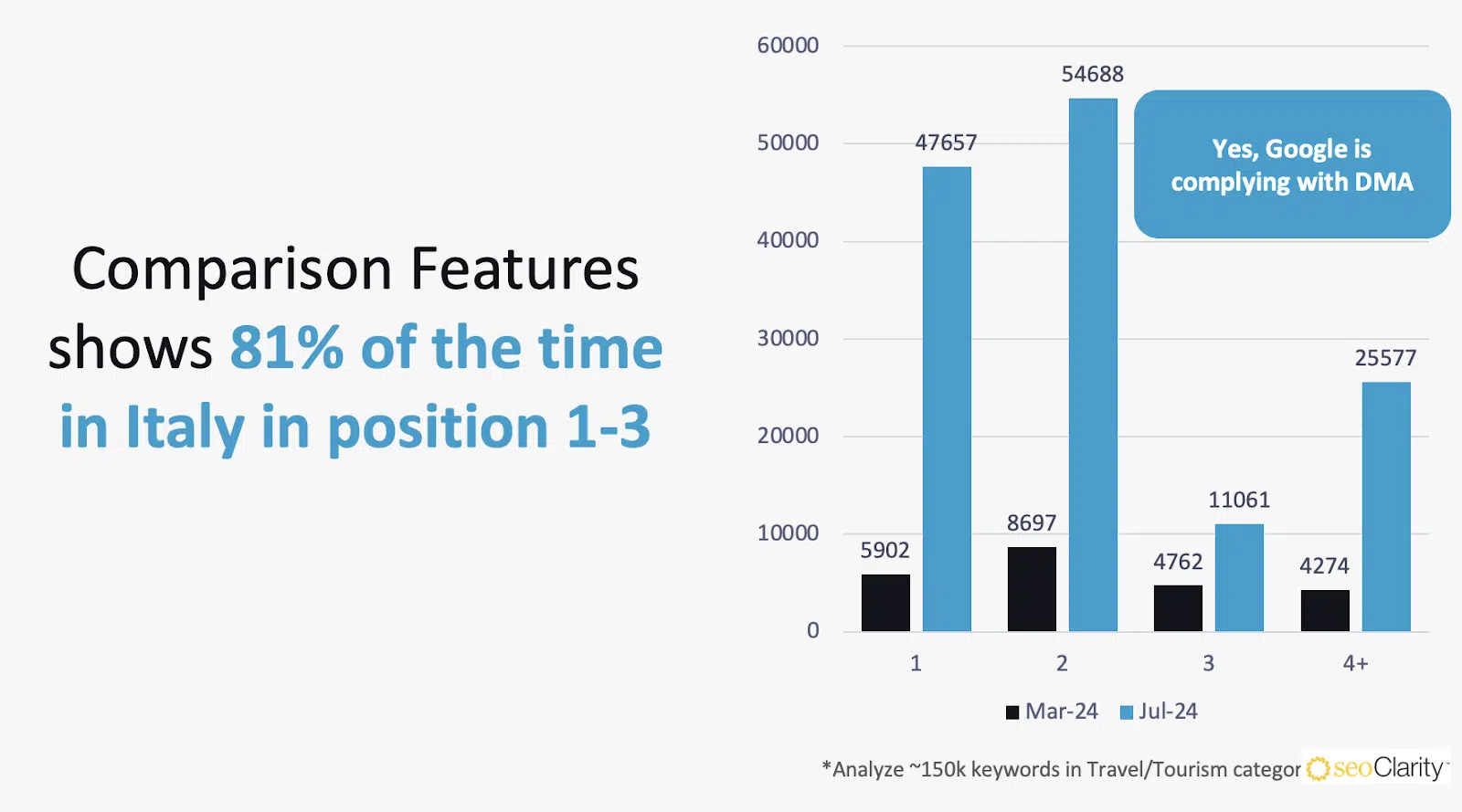

Knowledge from 1.35 million key phrases in Germany suggests comparable adjustments are seen.
For instance, when customers seek for lodge bookings, Google Accommodations, which as soon as dominated the highest place, is now extra steadily ranked second or decrease, with third-party comparability instruments showing in greater positions.
This represents a optimistic improvement for opponents who beforehand struggled to rank in opposition to Google’s personal providers.
Nonetheless, Google’s compliance isn’t common. In some cases, akin to flight searches, Google’s providers dominate the highest spots, suggesting that full compliance with the DMA continues to be a piece in progress.
Nonetheless, these preliminary adjustments clearly point out that the DMA is beginning to influence how search outcomes are introduced in Europe.
Dig deeper: Google updates data privacy policies for targeted ads in the EU
Key takeaways for SEOs and companies
The evolving search panorama post-DMA compliance affords useful insights for companies and SEOs trying to optimize their methods.
Experiment with SERP options
With the introduction of comparability options changing into extra distinguished in search outcomes, SEOs ought to concentrate on optimizing for these new snippets.
This consists of understanding how question shortcuts work and adjusting content material to suit these new codecs.
Monitor and report non-compliance
Whereas the DMA goals to make sure truthful competitors, there should still be cases the place Google’s search outcomes favor its personal providers.
Companies are inspired to stay vigilant and report any non-compliance to the suitable regulatory our bodies on to the DMA group here.
Keep agile and maintain testing
The search panorama is altering quickly. Companies have to experiment constantly with totally different optimization strategies.
This consists of leveraging new SERP options and adapting to evolving algorithms that prioritize comparability instruments and third-party providers over Google’s personal choices.
Contributing authors are invited to create content material for Search Engine Land and are chosen for his or her experience and contribution to the search neighborhood. Our contributors work beneath the oversight of the editorial staff and contributions are checked for high quality and relevance to our readers. The opinions they categorical are their very own.

